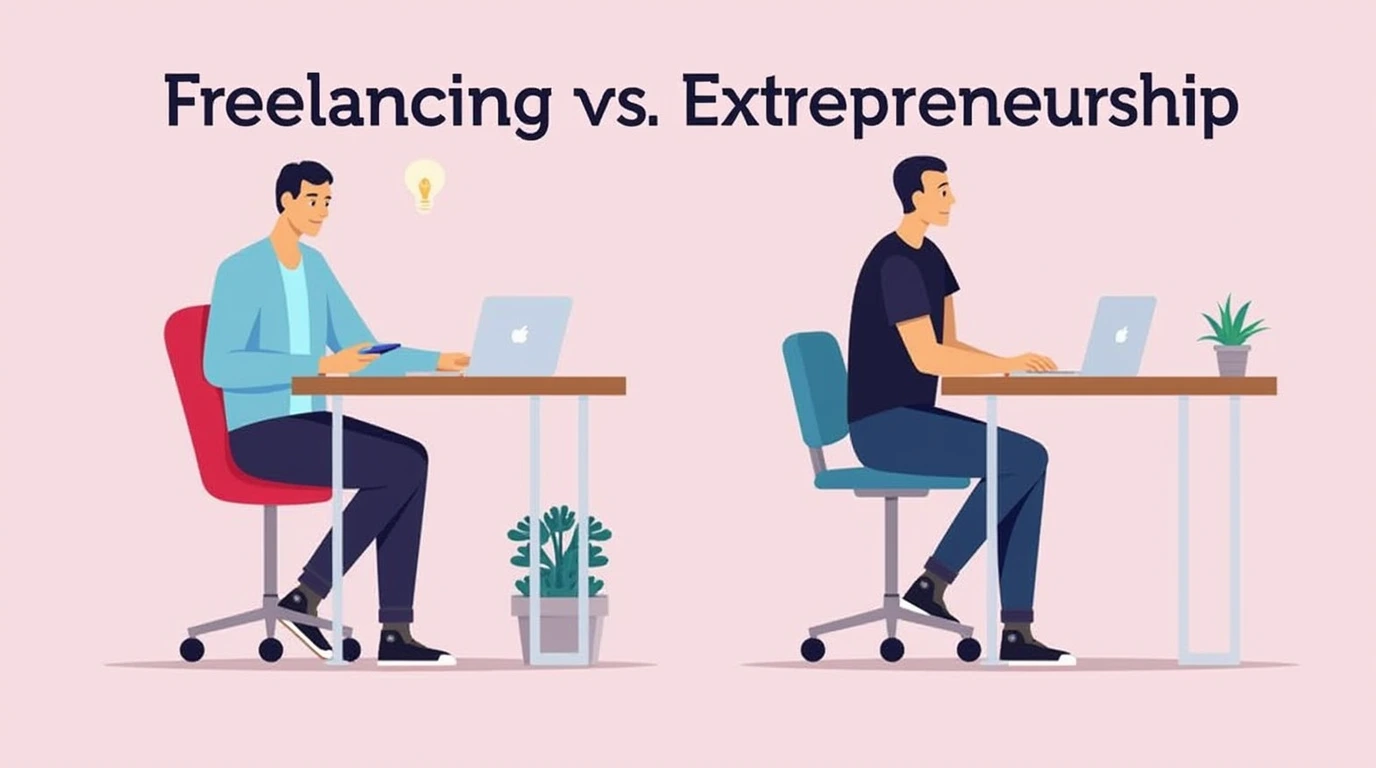The Best Fluffy Pancakes recipe you will fall in love with. Full of tips and tricks to help you make the best pancakes.
Table of Contents
Introduction to Freelancing and Entrepreneurship

Freelancing vs Entrepreneurship
Freelancing and entrepreneurship are two popular career paths that offer individuals the opportunity for independence and self-direction. However, while both terms signify a departure from traditional employment, they encompass distinct operational models and objectives. Understanding these differences is crucial for anyone considering which path might be best suited for their professional aspirations.
Freelancing refers to a working arrangement where individuals offer their skills and services on a project basis, often for multiple clients simultaneously. Freelancers typically operate as independent contractors, harnessing their specialized skills—such as writing, graphic design, or web development—to complete specific tasks for clients without being tied to a single employer. This flexibility allows freelancers to manage their schedules, select their projects, and often work from any location. However, it also means they must consistently seek new clients and projects to maintain their income.
In contrast, entrepreneurship involves launching and managing a business that aims to create products or services with the potential for growth and profitability. Entrepreneurs often take on greater financial risks with the hopes of establishing a sustainable enterprise. Unlike freelancers, who may prioritize immediate income through individual contracts, entrepreneurs focus on long-term business objectives and strategies for scalability. This can entail building a brand, hiring employees, and investing in marketing to increase visibility and attract customers.
While both paths encourage independence, the primary focus of freelancers is on client-based work, whereas entrepreneurs concentrate on building a business framework that can thrive over time. Individuals need to assess their personal goals and risk tolerance to choose between freelancing and entrepreneurship, as both routes present unique advantages and challenges.
Understanding Freelancing

Freelancing has emerged as a prevalent career path in today’s evolving job market, characterized by self-employment and the performance of work on a project basis for various clients. Unlike traditional employment, freelancers have the autonomy to choose their clients, projects, and working hours. This flexibility empowers individuals to manage their professional lives according to their preferences and personal commitments, making it an appealing option for many. learn: Freelancing for Beginners: How to Find Clients and1 Make Money.
Freelancers can be found across various industries, including graphic design, writing, programming, marketing, and consulting. Each of these fields offers diverse opportunities for independent contractors to market their skills and expertise. The nature of freelance work often necessitates a strong personal brand and an effective network of professional contacts, as obtaining new projects typically relies on referrals and a demonstrable portfolio. Consequently, freelancers must be proactive in showcasing their capabilities and seeking out new opportunities to sustain their careers.
A significant advantage of freelancing is the control over one’s schedule and workload. Freelancers can choose to take on multiple projects simultaneously or focus on fewer, more extensive assignments. This level of flexibility allows for a better work-life balance and creates the opportunity to pursue personal interests or other commitments. Moreover, freelancers can often set their rates, which can lead to potentially higher earnings compared to traditional employment.
However, freelancing is not without its challenges. Job stability can be elusive, as the self-employed often face fluctuating workloads and income streams. Additionally, freelancers must manage their own finances, including saving for taxes, healthcare, and retirement, which can be daunting. Building a solid client base takes time and effort and requires resilience in an often competitive marketplace. Understanding the dual aspects of freelancing—its freedom and potential instability—is essential for anyone considering this career path.
Understanding Entrepreneurship

Entrepreneurship is a multifaceted concept that embodies the spirit of innovation and risk-taking. At its core, entrepreneurship involves the process of starting, managing, and growing a business venture with the objective of generating value. learn Project Idea : How to Choose a Successful and Profitable Project-Idea; Entrepreneurs are individuals who recognize opportunities within the market and are willing to step forward to meet the demand, often navigating both the hurdles and rewards that come with business ownership.
There are various types of entrepreneurship, each defined by its unique characteristics and objectives. Small business entrepreneurship typically involves the establishment of local businesses, such as shops or service providers, which serve specific communities. learn: startup Success: How to Make Your Startup Bulletproof; These businesses may not require significant investment but are crucial for local economies. Scalable startups, on the other hand, focus on creating high-growth potential companies, often utilizing technology to rapidly expand their reach. This type of entrepreneurship aims to attract investors and scale operations quickly, leading to substantial profits. Another variant is social entrepreneurship, where the primary goal is to address social issues while achieving financial sustainability.
The responsibilities that entrepreneurs bear are significant and multifaceted. They are tasked with making critical decisions regarding the business model, financial management, marketing strategies, and operational processes. Moreover, entrepreneurs must also navigate potential risks, such as financial instability and market fluctuations, which can threaten their venture’s success. However, the rewards of entrepreneurship can be substantial, including financial independence, personal fulfillment, and the ability to create jobs and contribute to society. Through consistent commitment and innovative thinking, entrepreneurs can transform their ideas into successful enterprises, making a lasting impact in their respective fields.
Key Differences Between Freelancing and Entrepreneurship

Freelancing and entrepreneurship are two distinct career paths that appeal to various individuals based on their personal goals and circumstances. Understanding the fundamental differences between these paths can help aspiring professionals make informed decisions about their future.
One significant difference lies in the scope of work. Freelancers typically offer specific services or skills to multiple clients, operating as independent contractors. Their work is often project-based, allowing for flexibility in terms of hours and workload. In contrast, entrepreneurs generally focus on building a business that encompasses a broader range of products or services. This can include managing a team, overseeing operations, and developing a brand, which often requires a more significant commitment than freelancing.
Financial investments represent another key distinction. Freelancers usually start with minimal overhead costs, relying mainly on their skills and a computer. This aspect makes freelancing relatively accessible, as many freelancers can begin their careers without substantial financial investment. Entrepreneurs, however, often require a more significant financial commitment to launch their businesses, which might include costs for inventory, marketing, hiring employees, and securing office space.
When examining income potential, freelancers typically earn based on the projects they take on, with income fluctuating depending on client demand. While successful freelancers can achieve a comfortable income, they may find it challenging to scale their earnings significantly. Entrepreneurs, on the other hand, have the potential for exponential income growth as their business expands, though this comes with greater financial risk and uncertainty.
Risk levels and long-term objectives also differ markedly between freelancing and entrepreneurship. Freelancers may face risks related to fluctuating workloads and client availability, whereas entrepreneurs must navigate larger-scale uncertainties, including market competition and operational challenges. Overall, the choice between freelancing and entrepreneurship hinges on an individual’s risk tolerance, work style, and long-term aspirations.
Lifestyle and Work-Life Balance: Freelancing vs. Entrepreneurship
The choice between freelancing and entrepreneurship has significant implications for one’s lifestyle and work-life balance. Both paths offer distinct advantages and challenges that can impact personal well-being and the ability to cultivate relationships outside of work.
Freelancing is often regarded as a more flexible option. Freelancers typically have the autonomy to choose their hours, projects, and clients, allowing them to tailor their work schedules to fit personal commitments. This flexibility can lead to a more balanced lifestyle, with the opportunity to prioritize family, hobbies, and self-care. Freelancers can also create a conducive work environment, whether at home or in a co-working space, fostering productivity while maintaining personal comfort. However, this independence comes with its own set of challenges. Irregular income and the need for self-discipline can generate stress, which may, in turn, affect personal relationships.
Conversely, entrepreneurship often requires a greater time commitment, especially in the initial stages of establishing a business. Entrepreneurs frequently find themselves working long hours to manage the multifaceted demands of running a company, ranging from strategic planning to financial oversight. This intense dedication can limit personal time and strain relationships, as the focus is predominantly on business growth and success. Entrepreneurs must often navigate the complexities of balancing their professional aspirations with the needs of their families and personal lives.
Despite these differences, both paths can lead to fulfilling careers if individuals create structures that support their desired lifestyle. It is crucial for both freelancers and entrepreneurs to implement boundaries that safeguard their time and well-being. Finding equilibrium is key, enabling them to enjoy the benefits of their chosen career while maintaining healthy personal relationships and life satisfaction.
Financial Considerations: Earnings and Stability

When evaluating the financial aspects of freelancing and entrepreneurship, it is crucial to consider potential earnings, job security, and financial risks associated with each path. Freelancing often offers a more predictable income stream, as individuals can set their rates based on their skills and market demand. Many freelancers also have the flexibility to work on various projects simultaneously, potentially increasing their overall earnings. However, income can be inconsistent, especially for new freelancers who may struggle to establish a robust client base initially.
In contrast, entrepreneurship typically involves higher initial investments, which can lead to greater financial returns in the long term. Entrepreneurs invest in a business or product, with the potential for substantial profit once the venture stabilizes. Nevertheless, this path is fraught with risks, as the failure rate for startups can be significant. A lack of sales or unforeseen expenses can lead to substantial financial losses, and entrepreneurs may find themselves in a precarious financial position if their venture does not succeed.
Job security varies greatly between the two avenues. Freelancers generally lack the benefits associated with traditional employment, such as health insurance and retirement plans, which can affect long-term financial stability. On the other hand, entrepreneurs often face similar challenges, as their businesses take time to become profitable, and personal finances may be intertwined with business success. It is essential for both freelancers and entrepreneurs to develop robust financial plans. This could include emergency savings to navigate periods of low income, considering insurances to mitigate risks, and maintaining strict budgeting practices.
Ultimately, the choice between freelancing and entrepreneurship depends on individual risk tolerance, financial goals, and the ability to adapt to changing market conditions. A careful assessment of the financial implications of each path can lead to more informed decisions regarding long-term financial stability.
Skills Required: Freelancers vs. Entrepreneurs
The distinction between freelancing and entrepreneurship is not only marked by the nature of work but also by the distinct skill sets each path demands. Both freelancing and entrepreneurship require a blend of hard and soft skills, although the emphasis on each can vary significantly. Understanding these skills can help individuals assess their suitability for either route.
Freelancers typically rely on specialized hard skills directly related to their field of expertise, such as graphic design, web development, writing, or consulting. Mastery of these skills is crucial, as freelancers are often hired based on portfolio quality and expertise. In addition to hard skills, freelancers must also possess essential soft skills, including communication, time management, and self-discipline. Effective communication is vital for liaising with clients and managing expectations. Furthermore, self-discipline allows freelancers to work independently without the structure of a traditional office environment, enabling them to meet deadlines and fulfill commitments.
On the other hand, entrepreneurs require a more diverse skill set that spans beyond specific professional abilities. While hard skills related to product development or market analysis are important, soft skills become significantly prominent. Leadership and strategic thinking are crucial for entrepreneurs as they navigate the complexities of running a business. Entrepreneurs must also exhibit adaptability to respond to changing market conditions and challenges. Networking skills also play a fundamental role, as building relationships can lead to business partnerships, funding opportunities, and customer acquisition.
Individuals considering either freelancing or entrepreneurship should conduct a thorough assessment of their existing skills. Evaluating one’s own capabilities and how they align with the demands of each path can provide insight into which avenue may be more suitable for their career aspirations. Recognizing strengths and areas for improvement can ultimately guide potential freelancers and entrepreneurs in making an informed decision regarding their professional journey.
Future Trends in Freelancing and Entrepreneurship
The landscape of freelancing and entrepreneurship is continually evolving, influenced by various emerging trends that reshape how individuals approach work and business. One significant driver of change is technological advancement. With the proliferation of digital tools and platforms, freelancers can now connect with clients globally and manage their projects more efficiently. Automation and artificial intelligence are expected to further streamline workflows, allowing entrepreneurs to focus on higher-level strategies while optimizing operational aspects through new software solutions.
Economic shifts also play a crucial role in redefining the freelancing and entrepreneurship landscape. The rise of the gig economy has created a more favorable environment for independent workers, generating demand for specialized skills and services. In contrast, entrepreneurs have the opportunity to tap into new markets and diversify their offerings in response to evolving consumer preferences. The increasing tendency of companies to adopt flexible hiring practices is likely to bolster the freelance workforce, allowing entrepreneurs to scale their operations more dynamically.
Changes in workforce dynamics cannot be overlooked either. The COVID-19 pandemic has accelerated remote work trends, leading to a growing acceptance of freelance arrangements and alternative business models. As traditional employment structures evolve, more individuals are considering freelancing as a viable career path or entrepreneurship as a means of establishing job security. This shift raises questions about the long-term sustainability of both paths, particularly regarding income stability and healthcare options for freelancers.
Looking ahead, these trends in technology, economics, and workforce dynamics will undoubtedly influence how freelancing and entrepreneurship are perceived by future generations. Prospective freelancers and entrepreneurs must stay informed about these developments to navigate the complexities of their chosen paths effectively and make informed decisions that align with future market needs.
Conclusion: Making Your Choice

As we have explored in this blog post, the decision between freelancing and entrepreneurship is not merely a matter of preference but rather a choice that should align with your personal aspirations, lifestyle, and career goals. Each path offers unique opportunities and challenges, and the right fit can greatly enhance your professional satisfaction and success.
Freelancing typically appeals to individuals seeking flexibility and autonomy. This route allows you to leverage your skills on a project basis, creating a varied portfolio while maintaining control over your schedule and workload. Freelancers often enjoy a sense of independence, which can be attractive to those who prefer not to engage in the complexities of running a business. However, they also face the uncertainty of inconsistent income and the need for continuous self-promotion.
On the other hand, entrepreneurship involves a commitment to building a business that may require more structured planning and long-term strategic thinking. Entrepreneurs are often driven by a vision to solve problems or fulfill market demands, which can be rewarding both intellectually and financially. However, this path may entail a considerable investment of time, resources, and energy. The responsibility of managing a business, including its financial and operational aspects, can also bring about significant stress.
Ultimately, your decision should be rooted in introspection regarding your personal goals and lifestyle preferences. Consider your financial situation, willingness to take risks, and desired work-life balance. Assessing these factors will help you identify which path resonates with your vision for the future. Take the time to reflect on your strengths and aspirations, as this evaluation can guide you toward a fulfilling career that best suits your individual circumstances. The choice between freelancing and entrepreneurship is significant, and making a well-informed decision can lead to lasting satisfaction in your professional journey.









